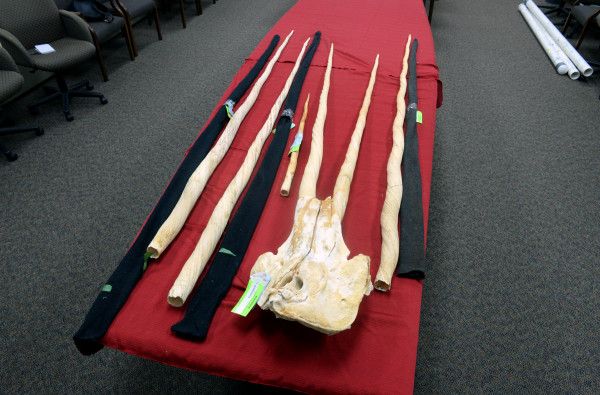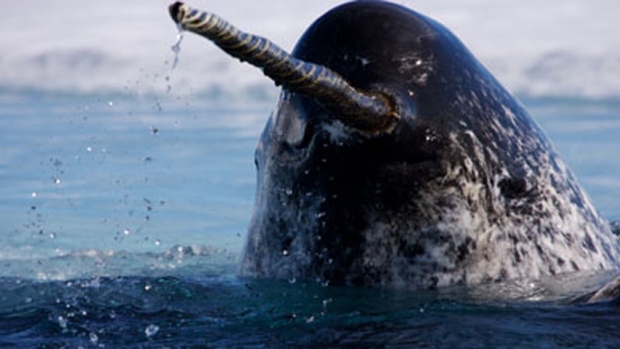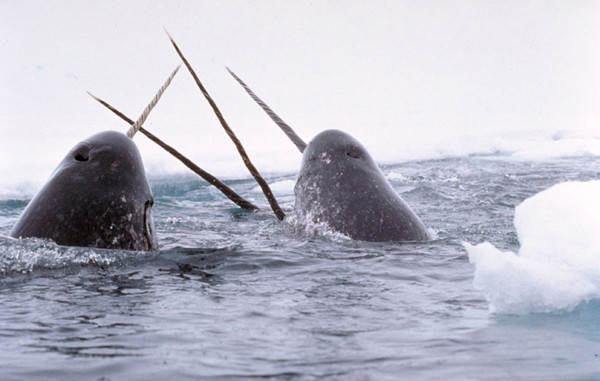by Steve Selden | Mar 25, 2016 | Conservation
A retired RCMP, recently convicted and sentenced of illegally smuggling narwhal tusks into the United States from Canada, has been extradited to the U.S. on related money-laundering charges in Maine. A New Jersey man, Andrew Zarauskas has also was convicted in 2014 and is currently serving time in prison. Jay Conrad from Tennessee awaits trial.
Gregory Logan, 58, of Woodmans Point, N.B., is being held in custody pending his trial date of May 3 in U.S. District Court in Bangor, Maine
Charges include smuggling of 250 narwhal tusks with a value of over two million US dollars into the United States by concealing them in false compartments in his vehicle. Prosecution asserts that Logan had been transporting tusks across the border since 2000 when he was still employed by the RCMP. He allegedly brokered the tusks to private collectors and then transferred the funds outside the US.

Narwhal tusks that were evidence in the trial of Andrew J. Zarauskas. Linda Coan O’Kresik | BDN photo.
Logan, whom was fined $385,000 and four months house arrest under an eight month conditional sentence, faces up to 20 years in prison and fines of up to $500,000 US with the money laundering charges in the states.
“As this case shows, wildlife trafficking can involve millions in illegal transactions, compounding the damage it does to the wealth and diversity of life on our planet,” Assistant Attorney General John Cruden, of the Justice Department’s environment and natural resource’s division, said in a statement. By pursuing the criminal financial transactions that flow from trafficking, we are making [it] a less attractive and more costly enterprise.”
Narwhals live year-round in the Arctic and are a protected species under the Convention on International Trade in Endangered Species of Wild Fauna and Flora (CITES).
Law prohibits importing narwhals, or any of their parts, into the United States, barring a special permit, under the Marine Mammal protection Act. Spiraled tusks, found predominately in males are actually a tooth protruding through the upper jaw, reach up to ten feet and can fetch nearly $100 an inch on the black market.
Co – conspirators Andrew Zarauskas, of Union, New Jersey,has already been convicted and sentenced to nearly three years in prison while Jay Conrad, of Lakeland, Tennessee, has plead guilty and awaits sentencing.

Andrew J. Zarauskas of Union, N.J. (left) was convicted of smuggling narwhal tusks into the US from Canada. Gabor Degre | BDN photo.
Evidence at trial showed Zarauskas, 61, doubled his money on the $85,000 he paid Logan between 2002 and 2008 for approximately 33 tusks. What was particularly egregious about Zarauskas’ case was that he was working as a confidential informer for the U. S. Fish and Wildlife Service in a separate case that did not involve narwhal tusk smuggling.
by Steve Selden | Sep 22, 2017 | Conservation

Narwhal tusks can grow more than 8 feet in length and demand high prices on the black market. Paul Nicklen/Getty Images photo.
Retired Canadian Mountie Gregory Logan, 60, of Saint John has been sentenced to five years and two months in a United States federal prison for smuggling nearly 300 Narwhal tusks with a value of $1.5 – $3 million US into Maine. The contraband tusks were hidden in false compartments in Logan’s vehicle according to U.S. prosecutors. Once in the United States, they were shipped from a post office box in Ellsworth, Maine, to wealthy buyers all across the country.
This story was first reported on in a March 2016 blog post on this site.
Narwhals, protected in the United States and Canada, grow ornate, spiral tusks that can grow longer than eight feet and are coveted for use in carvings, jewelry-making, and general display. Under the 1972 Marine Mammal Protection Act, it is illegal to transport any parts of a Narwhal across federal borders.
According to the indictment, Logan smuggled the narwhal tusks into the U.S. in 2000 while he was working as a Mountie. He retired from the police force in 2003.
Logan filled orders with his U. S. co-conspirators according to what they wanted in terms of quantity and size and then contacted northern Inuit hunters to supply the tusks.
“Unlawful wildlife trade like this undermines efforts by federal, state, and foreign governments to protect and restore populations of species like the narwhal, a majestic creature of the sea,” said acting Assistant Attorney General Jeffrey H. Wood of the Department of Justice’s Environment and Natural Resources Division.
U.S. District Court Judge John A. Woodcock sentenced Logan to money-laundering and conspiracy charges to which he pleaded guilty. Smuggling charges were dropped under a plea agreement. Logan has paid $350,000 in fines and served four months of home detention on a related wildlife – smuggling charge to which he plead guilty.
Co-conspirator and U.S. resident Andrew Zarauskas, of Union, N.J., was convicted and sentenced to 33 months. A Tennessee man had charges dismissed. Logan was pinned as the leader and organizer of the scheme and therefore sentenced most harshly.
“He directed and organized the way in which the tusks were smuggled and shipped as well as the ways in which the proceeds would ultimately be laundered into Canada. In sum, (Logan) was the ‘hub’ without whom the ‘spokes’ could not have succeeded in their joint criminal enterprise,” they said in court documents.
The U.S. Department of Justice detailed how the scheme worked in a news release:
“Logan knew that his customers would re-sell the tusks for a profit and in an attempt to increase that resale price, Logan would occasionally provide fraudulent documentation claiming that the tusks had originally belonged to a private collector in Maine who had acquired them legally,” it said.
“In addition to shipping the tusks from Maine, Logan maintained a post office box in the Ellsworth shipping store as well as an account at a bank in Bangor. Logan instructed his customers to send payment in the form of cheques to the post office box, or wire money directly to his Maine bank account.
“Logan then transported the money to Canada by having the shipping store forward his mail to him in Canada, and by using an ATM card to withdraw money from his Maine bank account at Canadian ATM machines. At times, Logan also directed his customers to send funds directly to him in Canada.”





